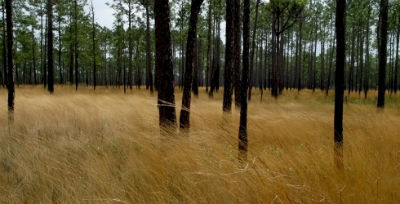 The Natural Heritage Trust Fund provided money to help preserve a portion of the Green Swamp in Brunswick County. The swamp is home to many native plants, like this hooded pitcher plant. Photo: N.C. Native Plant Society |
RALEIGH — As promised, N.C. Senate leaders released their budget Sunday night, closely mirroring Gov. Pat McCrory’s proposal in terms of overall dollars, but it contains a number of key distinctions in priorities, including a complete overhaul of the state’s conservation trust funds.
The $20.58 billion proposed budget, which runs more than 400 pages, is heavy with policy provisions, a reverse in direction for Republicans who control the N.C. General Assembly. In their first budget after taking control of the legislature last year, they had begun to limit the amount of special provisions in the budget bills.
Supporter Spotlight
But this proposed budget contains numerous policy provisions, including the plans to dredge coastal inlets and the reorganization of the state’s environmental boards and commissions that have already surfaced in other legislation this session.
Other provisions restructure the environmental trust funds, create of new state programs on land and water conservation and on wastewater and stormwater infrastructure and a new task force charged with studying the possible purchase of the Oregon Inlet from the federal government.
Trust Funds Reorganized
Although close in total spending to the McCrory’s plan, the Senate budget more than doubles the conservation funding levels in McCrory’s budget.
The Senate plan would merge two of the existing four conservation trust funds, the Natural Heritage Trust Fund and the Clean Water Management Trust Fund, into a new land and water conservation fund, called the Water and Land Conservation Fund. It would be managed under a new program in the state Department of Environment and Natural Resources, or DENR. The new fund would see $12 million in the 2013-14 fiscal year, which starts July 1, and $14 million for 2014-15.
That’s about half what the two funds received separately the last couple of years.The heritage trust fund provides supplemental funding to select state agencies for the acquisition and protection of important natural areas and to preserve the state’s ecological diversity and cultural heritage and to inventory the natural heritage resources of the state. Created in 1987, the fund received about $12 annually from 25 percent of the state’s portion of the tax on real estate deed transfers and from a portion of the fees for personalized license plates.
Supporter Spotlight
 The Clean Water Management Trust Fund helped preserve the longleaf pine forest of the Holly Shelter Gamlands in Pender County. Photo: CWMTF |
The clean water fund, which spent almost a billion dollars preserving land and protecting water quality all across the state, was once the premier source of funding for innovate water-quality projects, getting $100 million a year. But it has been on life support since the Republican takeover. Its budget has been slashed to about $12 million, and it was destined for elimination in McCrory’s proposed budget.
The states’ remaining conservation the Agriculture Development and Farmland Preservation Trust Fund and the Parks and Recreation Trust Fund, would remain as separate trust funds.
The Senate plan repeals the legislation creating both the Clean Water Management Trust Fund and the Natural Heritage Trust Fund, moves their unencumbered balances to the new fund and transfers personnel to a new Land and Water Conservation Program in DENR. It will work on grants under the new program in conjunction with a new nine-member Land and Water Conservation Authority. The group, appointed by the governor and the legislature, would have the power to award the grants from the trust fund and from a new conservation easement endowment. State agencies, local governments and non-profit conservation organizations would be eligible to apply for grants from the Water and Land Conservation Fund.
The Senate plan follows the governor’s budget in eliminating most dedicated funding streams, including a deed tax that supports the Natural Heritage Trust Fund and the Parks and Recreation Trust Fund. The money would be replaced under the Senate plan with direct appropriations and the revenue from specialty license plates supporting conservation.
The new conservation fund won quick approval from a coalition of environmental and conservation groups called the Land for Tomorrow.
“We’ve seen that the Senate recognizes the role that conservation plays in accelerating our state’s economic recovery,” said Katherine Skinner, executive director of the N.C. Chapter of The Nature Conservancy and a member of the Land for Tomorrow executive committee. “Healthy natural lands and water are the foundation for the state’s largest industries – agriculture, tourism and the military – and are powerful draws for new businesses.”
She said the Land for Tomorrow will work with leaders in the N.C. to restore dedicated funding to the conservation funds.
DENR officials foresee no roadblocks in merging the trust funds, noted Michelle Walker, a department spokesperson, but they are still studying the plan. They’re pleased, she said, that the Senate has committed continued funding to the new fund.
 Katherine Skinner |
 Bill Holman |
Under the Senate’s proposed budget, the Parks and Recreation Trust Fund, which works to both expand and maintain state parks and also provides matching grants for local governments to put toward developing and expanding local parks projects, receives an $11 million appropriation in 2013-14 and $13 million in the next fiscal year.
The state’s fourth existing conservation trust fund, the Agricultural Development and Farmland Preservation Trust Fund, will also remain a separate entity and is slated to receive recurring funding of $1.7 million under the Senate budget proposal.
“Conservation funding was hit hard when the economy went into recession several years ago. We thank our friends in the Senate for finding a creative solution to protect conservation funding and streamline land conservation in North Carolina,” said Bill Holman, North Carolina director of The Conservation Fund.
Budget Bullets
It’s impossible to completely digest a 400-page budget document that was released Sunday night, but here are a few highlights that we gleaned from those reams of paper:
- The fees for all commercial fishing licenses are increased. Licenses for ocean fishing piers increase from 50 cents a foot to $4.50.
- The Adopt a Trail program is eliminated, saving $108,000.
- A new Water Infrastructure Authority and division in DENR are being created with a new assistant secretary. It will oversee investments in drinking water and the clean water state revolving loan funds.
- The Wildlife Resources Commission is cut by $9 million.
- Partnership for the Sounds is eliminated, saving $391,000.
- And all you hybrid drivers will be hit with a new fee of $50 a year to pay for new roads.







